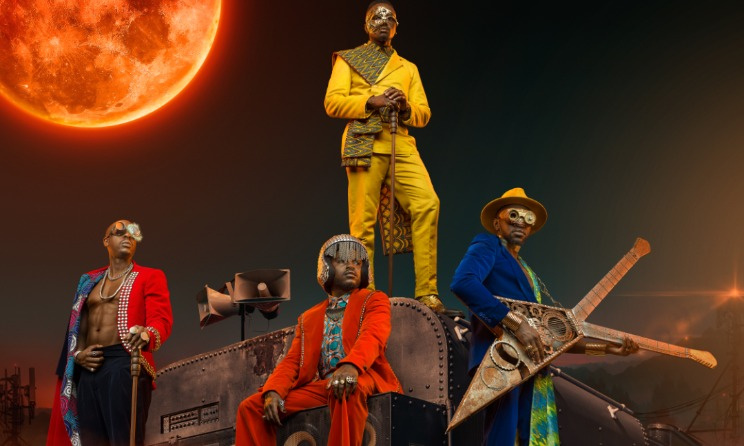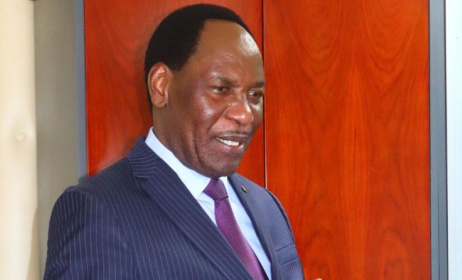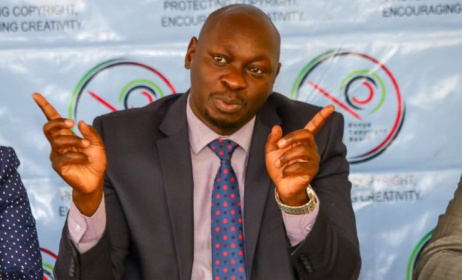Interview: Sauti Sol on new album Midnight Train
Sauti Sol has released its new album Midnight Train via Universal Music Africa (UMA). Before the 5 June full-album release, the Kenyan band released the singles 'Disco Matanga', 'Insecure', 'Brighter Days' and 'Suzanna'.
 Sauti Sol has released the 13-track Midnight Train album.
Sauti Sol has released the 13-track Midnight Train album. Bien-Aime Baraza, Savara Mudigi, Willis Austin Chimano and Polycarp Otieno.
Bien-Aime Baraza, Savara Mudigi, Willis Austin Chimano and Polycarp Otieno.
Midnight Train is lined from start to finish with catchy songs and packs a serious punch of memorable hits. The album comes after the release of Live and Die in Afrika in 2015. Previous studio releases include Mwanzo (2008) and Sol Filosofia (2011).
Sauti Sol has become a serious player on the East African pop music scene. Its members Bien-Aime Baraza, Willis Austin Chimano, Polycarp Otieno and Savara Mudigi continue to evolve and diversify their writing style while maintaining their raw musical identity.
In February, the award-winning group went viral on social media after becoming the first Kenyan act signed to UMA. For most local artists, the deal provided assurance that Kenyan artists could play in the big leagues.
Music In Africa spoke to singer, keytarist and sax player Chimano ahead of Midnight Train's release to discuss the making of the album and the band's incredible success.
MUSIC IN AFRICA: Can you tell us more about the album's title?
CHIMANO: In the past, it would take one about 10 hours to travel by train from Kenya's capital Nairobi to its second-biggest city Mombasa. The symbolism here and on the cover art is that our work and we are always steadily moving as we gain more territory and fans. This album is a representation of our hard work for the last 11 years, and we are grateful for this achievement and looking forward to the next stage of our career.
The songs are mainly based on real-life situations...
Yes, you are right. It is easier for us to release relatable music because we also go through the same things. We are human and it is also just beautiful to tell life stories from different perspectives. But we've also had our moments of writing generic stuff, or stuff that is considered generic, and that can be fun too [laughs].
What was it like making this album considering that you've been making music together for more than 10 years?
Creating this album has been such an honest gratifying experience. It is one of those projects where you feel you have hit the right note with whatever you were looking for. It was such a collaborative effort – not just with featured artists but songwriters, session musicians and videographers. Almost half of the songs on the album were written about three years ago and even recorded for a different project. But I guess good things take time and we are happy they're finally coming out on this project. We are also excited about our signing with Universal Music Africa, which came at the right time because the team has been so supportive.
Any setbacks during the creative process?
Our biggest challenge was to settle on which songs to keep and which once to drop. We started with 20 songs and eventually settled for 13. Nevertheless, we will probably revisit those songs soon. A deluxe edition perhaps. We will figure it out eventually.
How long did the UMA negotiations last?
It took almost two years. At some point, we were wondering if it would materialise because both parties were good at negotiating [laughs], and each needed to finalise on the best deal, and it was eventually worth it.
What does the deal mean for the group?
This is just another step for us, and we are, of course, grateful for it. Our focus is this album and we will put our hearts to promoting and getting it to a broader global audience with the help of Universal and its networks. We also plan to keep making more music and start working on our next project, whichever it may be. Sessions are already at play for a new body of work.
What do collaborations do for a group like yours?
We feel collaborations are necessary because they do incredible work for both parties. Collaborating with likeminded artists is always a fantastic experience. It has increased our reach and gained us new fans across the continent. It has also challenged our writing skills to experiment with different genres that we can add on to our sound.
What is different about your music compared to other Kenyan pop?
I believe we stuck to our guns and were not thrown in the rat race that is continually looking for hits. We just trusted the principle of our process. Nevertheless, there is fantastic pop music in Kenya.
You have already released visuals for some of the songs on the album. How do you feel about the reception so far?
The reception has been most incredible. Visuals will be and already are the cornerstone of this album and future albums. We are going with the '70s and' 80's era, and the main reason has to do with our upbringing where our folks used to dress in the style of that era and listen to the music of that era.
You started the Sol Generation Records label last year. What was the inspiration behind that, and what is your vision for it in the next 10 years?
Starting a label has always been one of our dreams. We want our record label to be an entity that is run by established artists who understand the challenges artists face. We want it to encourage young creative thinkers. Our first signees formed the Sol Generation group, whose tagline is DOPE [Discipline Order Passion Endurance] We'd like to give them what we never had when we started music – opportunities and guidance.


































Comments
Log in or register to post comments